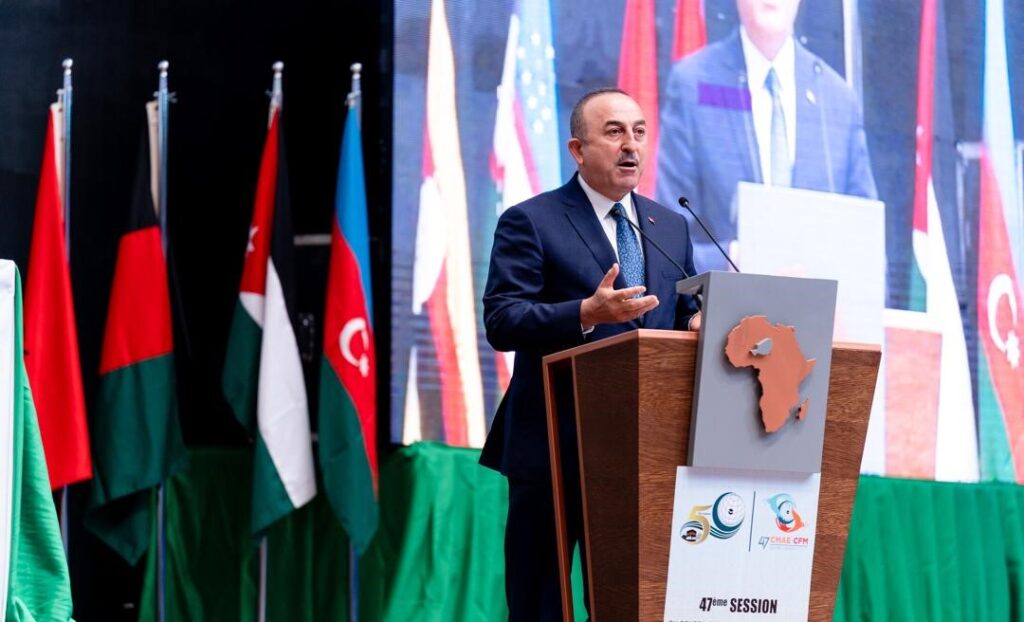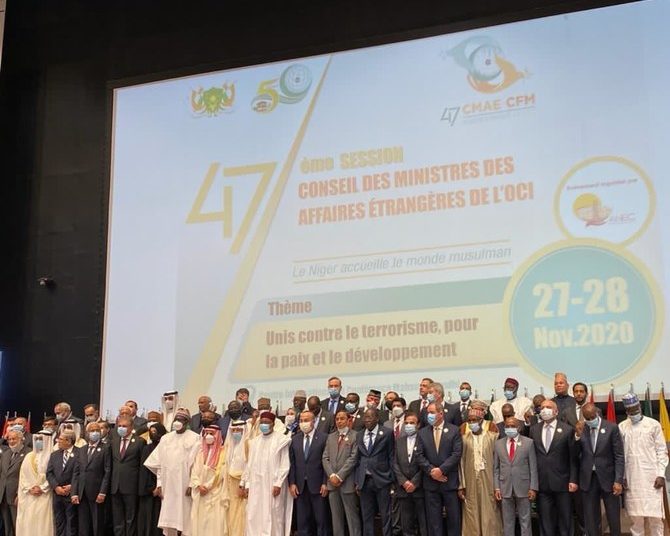Nordic Monitor
Turkey was isolated among members of the Organisation of Islamic Cooperation (OIC) due to its Libya policy at an OIC meeting attended by foreign ministers from member states.
The 47th session of the OIC Council of Foreign Ministers (CFM) was held in Niamey, Niger, on November 27-28, 2020. The CFM was chaired by Nigerien Foreign Minister Kalla Ankourao, and Turkey was represented by its top diplomat, Mevlüt Çavuşoğlu. Delegations from the OIC’s 57 members and five observer states focused on a wide range of topics and issues faced by the Muslim world during two-day talks.
The OIC foreign ministers had called on Turkey and other actors to end their military intervention in Libya and respect the territorial integrity of the country while praising regional initiatives carried out by neighboring countries including Egypt, Algeria and Tunisia in facilitating reconciliation among Libyans.
The CFM adopted resolution No 7/47-POL noting the situation in Libya directly affects the Libyan people and neighboring states as well. According to the OIC Charter, the CFM adopts decisions and resolutions on matters of common interest in the implementation of the objectives and the general policy of the organization.
The resolution affirmed “the need to abstain from interfering in the internal affairs of Libya and to ensure its sovereignty, independence and territorial unity, and the rejection of the military solution and any foreign military intervention.”
Turkey has had a military presence in Libya since December 2019 in accordance with security agreement signed by Turkish President Recep Tayyip Erdoğan and Fayez al-Sarraj, head of the UN-recognized Government of National Accord (GNA). Turkey’s intervention has proven decisive in the conflict, enabling the GNA to re-establish control over some Libyan territories.
Two weeks after the adoption of the OIC resolution urging member states to end their military presence in Libya, the Turkish parliament approved a bill extending troop deployment in Libya for 18 months.
Following the Turkish parliament’s decision, Defense Minister Hulusi Akar, accompanied by Turkish commanders, visited Libya on December 26 to highlight his country’s intention to maintain its military presence in the North African country. In Libya, Akar threatened that the forces of Khalifa Haftar and their supporters would be viewed as “legitimate targets” if they attempted to attack Turkish forces in the region.
In October the GNA and LNA signed a ceasefire agreement, and the UN has been pushing a political dialogue aimed at elections next year as a solution.

The resolution urged OIC member states to support national reconciliation in the country and to encourage “inter-Libyan dialogue towards evolving a consensus on bringing about sound democratic transition and adopting a new constitution.”
OIC member states stressed the importance of the “Tunisian, Egyptian and Algerian” Tripartite Initiative presented by Tunisian President Beji Caid Essebsi and “the importance of the neighboring countries (Egypt, Algeria and Tunisia), in facilitating reconciliation among Libyans and helping them to realize a comprehensive political settlement.”
The decision also welcomed “meetings hosted by the Arab Republic of Egypt aimed at unifying the military institution and at reconciling the views of Libyan parties.”
The OIC is the second largest inter-governmental organization after the UN with a membership of 57 states spread over four continents. According to its charter (Article 2/4) member states should “respect national sovereignty, independence and territorial integrity of other Member States and shall refrain from interfering in the internal affairs of others.”
The OIC resolution on the situation in Libya:
The Turkish government has been criticized by international and regional organizations for deploying its troops to Libya, shipping military vehicles and arms and moving jihadists from Syria’s Idlib region to the country. Turkey has also been accused of committing regular and increasingly blatant violations of the UN arms embargo on Libya.
In September the EU Foreign Affairs Council decided to freeze the assets of Avrasya Shipping, which operates the Çirkin, a freighter found to have violated the arms embargo on Libya established in UN Security Council Resolution (UNSCR) 1970 (2011). The Çirkin was linked to the transport of military material to Libya in May and June 2020, the EU said.
In May the EU launched a new Mediterranean naval and air mission named Irini to monitor the UN-mandated arms embargo on Libya, imposed by UNSCR 1970, and to stop arms shipments to the war-torn North African country.
In June UN rapporteurs sent a joint letter to the Turkish government seeking further information about its role in the recruitment, financing, transportation and deployment of Syrian fighters to Libya.
According to the allegations underlined in the letter, Turkey effectively deployed mercenaries to an armed conflict in Libya by recruiting, deploying and paying fighters, including children, from several Syrian armed groups to take part in military operations in Tripoli in support of the GNA.
The UN letter also revealed how the Turkish government used its paramilitary contractor SADAT for those operations. “Turkish authorities allegedly contracted private military and security companies to facilitate the selection as well as the preparation of official and contractual documentation for the fighters, apparently in coordination with the Turkish security services. One of the companies cited in this context was Sadat International Defence Consultancy [SADAT],” the letter said.
A UN Panel of Experts report released in December 2019 identified multiple and routine military equipment (drones, armored vehicles, laser weapons and other arms and ammunition) shipments in 2019 from Turkey by Turkish authorities, companies and individuals in violation of UNSC Resolution 1970. The report also noted that a large consignment of Kirpi 4×4 Mine Resistant Ambush Protected (MRAP) vehicles, manufactured by Turkish defense contractor BMC, was offloaded in Tripoli from the Moldovan-flagged MV Amazon on May 18, 2019.












